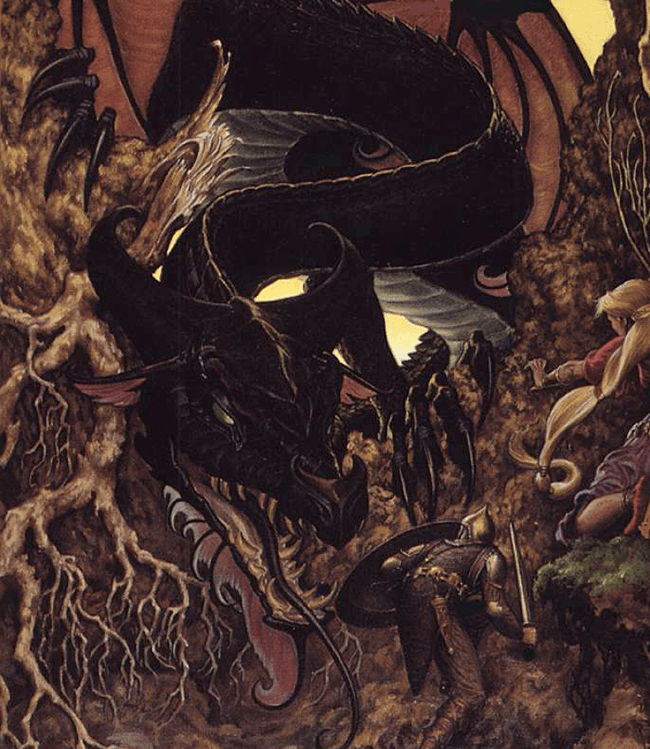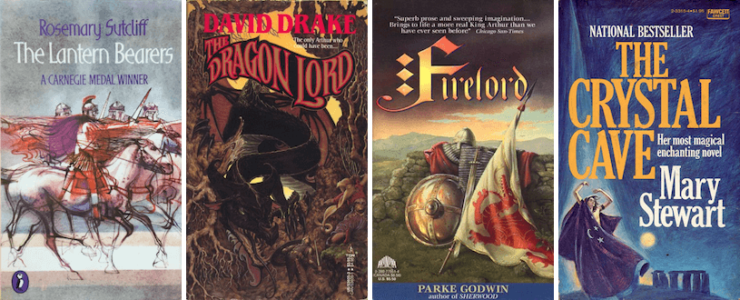I suspect a lot of people’s minds ran in the same direction mine did at the news that a girl named Saga had pulled a fifteen hundred-year-old sword from a lake. Not all swords are Excalibur, of course, and the lake in question was in Sweden, but Britain could do worse than seeing if Saga has any interest in becoming Prime Minister.
All of which reminded me of Arthuriana, and my first and favorite Arthur novel, Rosemary Sutcliff’s The Lantern Bearers (1959). The novel takes its title from a statement by Eugenus the Physician:
“We are the lantern bearers, my friend; for us to keep something burning, to carry what light we can forward into the darkness and the wind.”
Arthur (or Artos, as he is called in this book) plays only a supporting role, but it’s enough of a role for this to be the ur-Arthur story for me.
The end of the Roman occupation of Britain brings little comfort to the novel’s protagonist, Aquila. Firstly, he is a Roman himself and so sees the Empire and all it brings as good. Secondly, even as the Roman soldiers are called back to Rome, the Saxon hordes are moving in to grab land, slaves, and wealth, with no regard for preserving what civilized norms existed at the time . In short order, Aquila’s family estate is in flames, most of his family are dead, and his sister has been carried off by a Saxon raider. Aquila survives to try to find a new life in a Britain horribly transformed .
For me, it’s not a true Arthur story if it’s not explicitly set in a post-Roman Romano-Celtic Britain grappling with Saxon invaders, struggling to keep the light of civilization lit. You can keep your vague fantasy lands with unspecified histories (except when past events are needed to provide this week’s villain with an appropriate backstory). For me, magic is optional: it’s the history that matters .
Oh, and vast castle complexes like the Château de Pierrefonds (used as a stand-in for Camelot in the TV show Merlin) are right out. It’s a fine example of a 19th-century restoration of work dating from (variously) the 12th to the 13th century. It’s also French. It has nothing to do with anyone one would find in 5th-century Britain.
All this means that a great many Arthurian books just don’t evoke the particular frisson that I love—but there are a few that fit the mould Sutcliff created.
There’s David Drake’s The Dragon Lord (1979, revised 1982). When Arthur demands a dragon to set on the Saxons, Merlin prudently assigns the task of collecting certain necessary components to a pair of murder hobos adventurer protagonists Mael mac Ronan and Starkad. All that remains is for the two adventurers to retrieve the components (or for their replacements to do so, should they fail) and a living dragon will surely be Arthur’s. Because that will end well.
Parke Godwin’s Firelord (1980) and Beloved Exile (1984) are two related historical novels. In the first, King Artos (also Artorius; he is, after all, a Romanized Briton) relates the story of his life as he slowly succumbs to the wounds he suffered at Camlann . In the second, Guenevere does her best to hold Britain’s fragile alliances together in the face of Saxon invasions. She is determined and talented, but her allies demonstrate the same canny insight that would later lead their very distant relatives to fight for the wrong side at Flodden. I am afraid all does not go entirely well for her and her allies.
Saxon victory is more or less baked into any Arthurian tale that is even quasi-historical. Godwin gives his version more apparent historicity than many of his rivals and predecessors, and also gives his characters more depth. I always expected a third book in the series (mainly because I expect books to come in threes), but no such luck. (Well, there is a third book, according to Wikipedia, but it’s a prequel.)
Mary Stewart’s The Crystal Cave (1970) explores post-Roman Britain from the perspective of a character who is often quite ambiguous in other versions of the tales: Merlin. Here he is known as Myrddin Emrys. Myrddin’s second sight makes him a figure of suspicion; the fact that he is the bastard son of a Welsh princess also does him no social favours. He finds his way to the court of Romano-British war leader Ambrosius Aurelianus, where he becomes entangled in the defense against Vortigern.
Where’s Arthur, you ask? Well, certain events are needed in order for Arthur to appear, and Myrddin plays an indirect role in those.
Unlike certain other versions (read: all sixty-five episodes of the Merlin TV show), Myrddin isn’t portrayed as a gormless ninny, and he has cunning and insight to go along with his magical gifts.
As narrow as my criteria are, I am sure there are other takes on the Matter of Britain that would please me, so feel free to suggest them in comments .
1: Does there need to be a disclaimer about what was considered normal and acceptable by the Romans? A lot of things we would not approve today. But at least they had books and impressive civil engineering.
2: Not that it would have given Aquila much comfort, but his Saxon enemies would later encounter the Vikings, the Danes, and after them, the Normans.
3: Not that I think Arthur was a historical figure.
4: Probably better to have written his autobiography before being mortally wounded, but a course of action in no way out of character for the man who removed a vital component of Britain’s magical defences out of pride.
5: Very distant because Godwin’s Britons are essentially Welsh and the brain trust responsible for Flodden were the Scots. If any of you want to discourse on the differences between the Goidelic languages and the Brittonic languages, now is the time. I used a horrific Scottish defeat because I couldn’t think of a similar scale one for the Welsh . It was all too easy for the Scots.
6: Not Marion Zimmer Bradley’s Mists of Avalon, please.
7: The Welsh, to the best of my knowledge, lost wars because they had fewer people and a smaller economy than their invasive neighbours. The Scots, on the other hand, sometimes explored bold gambits like inviting the king of a notably aggressive hegemonizing swarm to settle a dynastic dispute, and parking a poorly armed army on marshy, exposed land in an apparent attempt to disarm the other side by having the Jacobite soldiers sequester British ammunition securely within the Jacobite soldiers’ bodies.
In the words of Wikipedia editor TexasAndroid, prolific book reviewer and perennial Darwin Award nominee James Davis Nicoll is of “questionable notability.” His work has appeared in Publishers Weekly and Romantic Times as well as on his own websites, James Nicoll Reviews and Young People Read Old SFF (where he is assisted by editor Karen Lofstrom and web person Adrienne L. Travis). He is surprisingly flammable.











